Back in August, we connected with some of the fine folks that have been working to prepare the first Boeing 727 for its last flight. At the time, they were painting the plane and it looked damn good. Although a new coat of paint will make the plane look slick, it doesn’t exactly get it airborne. What does? Engines, of course.
I heard that they took possession of a few Pratt & Whittney JT8D engines and I wanted to get an update on how things were going and also take a tour of the interior.
When the aircraft was donated to the Museum of Flight, it was almost fully restored to how it looked (inside and out), when it first flew for United Airlines. So, I headed to the Museum of Flight Restoration Center at Paine Field and see how things were progressing.
Although the main Museum of Flight facility located down south at Boeing Field is pretty sweet, I always love getting to the Museum’s Restoration Center at Paine Field. The planes just feel more alive and it is interesting to see how those who volunteer there restore aircraft.
- Open wide!
- Going into the 727
- A beauty!
I met up with Crew Chief T.C. Howard, who is leading the restoration project and is more of an AvGeek than probably most of you reading this combined — and that is a huge compliment. He has a vast knowledge of aviation and mechanics, and knows a thing or two about the Boeing 727. Plus, he is just a really cool guy who loves to share his passion.
It is one thing to look at the parts and pieces, but its another to have someone who knows them in great detail and can explain things in terms that I can understand.
As we walked into the main working space, I could hear the sound of wrenches and people taking care of business. I also couldn’t help but notice the five JT8D engines, sitting between the Boeing SST mock-up, a classic fire truck, and the Lockheed Jetstar prototype. Let’s pause a moment and just think about how awesome that last sentence was.
Although not a expert on the Boeing 727, I do know that it only has three engines… so why did they need five? Three were to be the used on the 727 and the other two for parts. The engines were kindly donated by FedEx and will hopefully serve their purpose well.
- The side of a JT8D engine
- Looking straight on
- Their cat makes sure that people are doing their jobs well
The three main engines did not all come from the same plane. TC took the time to show me how (besides the obvious – needing to be attached to different areas of the plane) they were not set up all the same. Brackets, tubing, and other parts weren’t all exactly where one would expect them to be, due to the years of being in service, on different aircraft, and mechanics sometimes needing to get creative to keep them running optimally. This has added additional challenges for the restoration team, but nothing that they cannot handle.
During our tour of the engines, they needed to move one around so that it could be picked up by a forklift and taken off its stand. Am I just going to stand around and watch? Heck no… I put down my stuff and even though I was in business casual clothes, I helped out. Not saying I made much of an impact (at all really), but not going to lie, I did feel a bit closer to the project. I couldn’t imagine how the guys there feel when they put in so much passion, time, sweat, and love into this 727.
Then it was time to head outside to the 727 and get a tour inside. Although the Restoration Center is open to the public and you can get up and close to the 727, the interior is closed. Not that they don’t want to share with the public, but the volunteers working need constant access and unfortunately when the public also has access to cool things, parts and pieces end up going missing.
Many years ago, before I knew how to take photos — or even write well (Editor’s note: based on the amount of editing I do on your stories, not sure if you “write well” now… but I will agree with you “writing better”), I took a tour of the interior.
Stepping inside was like stepping back in time. Although I am a child of the 80s, the interior still brought back memories of my childhood, especially the colorful bulkhead and flying the tri-holer around the U.S.
Although the back of the plane was pretty cool, I knew I wanted to end up in the flight deck — that was going to be the climax of my visit. But, I took my time, by slowly starting in the back and moving towards the front.
- The United first class in the front of the 727
- The cart-closet has a window
- How can you not love that?
Before getting to the flight deck, I made my way through the first class cabin. I hear “flying is not the way it is used to be,” all the time. They are right.
Although cool, in a historical sort of way, this product doesn’t have many of the niceties that we enjoy today. The seat pitch isn’t that great, no in-flight entertainment (IFE), but I guess you do have the ashtrays, if that was your thing back then. Of course, we could argue that United’s service might have changed a bit since then… but that is for another story.
Then it was time to head to the flight deck. Just amazingly beautiful in so many ways. Airline flight decks have changed just a little bit (that is sarcasm, they have changed A LOT) over the years.
For ease of flying, safety, and costs these changes are all great. But the inner five year old in me loves all the gauges, buttons, and switches. Okay, the adult me likes them too — although I promised I wouldn’t touch anything without first asking. I ended up asking quite a bit.
One of the best parts is the engineering station — something not seen in many airliners still flying today. I first sat in the engineer’s seat and absorbed my surroundings, while looking at the many different gauges and switches.
- Close up to some switches
- First officer
- Engravings
Then I moved to the Captain’s seat and oh yea — that felt good. I could have stayed in that seat for hours, but figured I probably should take my photos, ask some questions, and slowly (very slowly) make my way back outside and say good bye to the first 727… for now.
So… the big question? When is the first Boeing 727 going to fly again? When it’s ready.
Yea, I know… that is not the answer you wanted to read, but it is as close to the truth as I can give. In our last story, we had reported it might fly in October and that was a bit optimistic. However, I have talked to many people on and off the record about the 727 flying again, and the huge majority agree that this plane will fly once more. There are surely challenges, but when is aviation not challenging?
When it does take its last flight, do not worry… you won’t miss it. We will be covering it on AirlineReporter and hopefully we can even set up a special event to mark the occasion.
To give some shoutouts to those folks working hard to make this work… T. C. Howard’s crew working on the EBU (engine buildup) has consisted of Richard Johnson, Jim Munneke, Landon Nye, Rich Stein, John Catanzaro, Al Horne, Ross Michel, and other Restoration Center volunteers.
Tom Cathart, Director of the Museum of Flight Restoration Center and Reserve Collection, assisted with many of the moves of the JT8D15 engines and installation of their thrust reservers. The donated JT8D15 engines for the UAL 727 and the engine #1 and #3 loaners from Fedex was accomplished by Bob Bogash.
If you want to help out, they are looking to get people who are a qualified ex or current United mechanic, ex or current flight line mechanic (airline or aircraft company), and/or hold a FAA AP license. If that is you and you want to help out, shoot me an email (da***@*************er.com) and I can connect you. There is still a long way to go, but with all these passionate people who are motivated to get this bird airborne, I have no doubt that it will happen!
See more photos of the first Boeing 727, the restoration, and the interior on our Flickr page.
Comments are closed here.
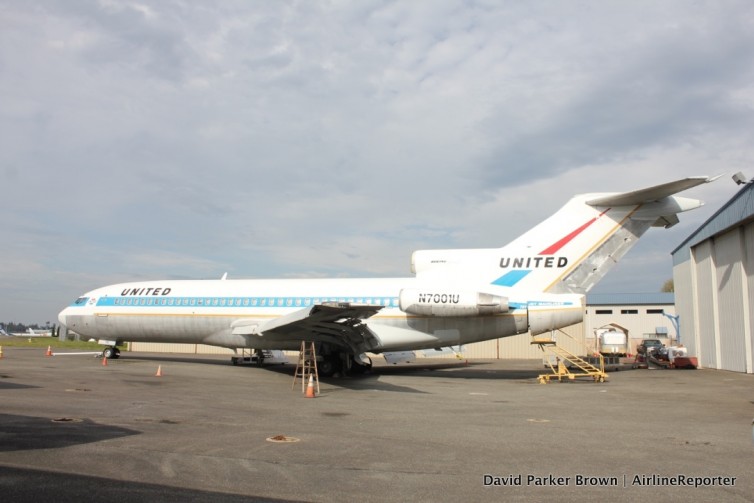
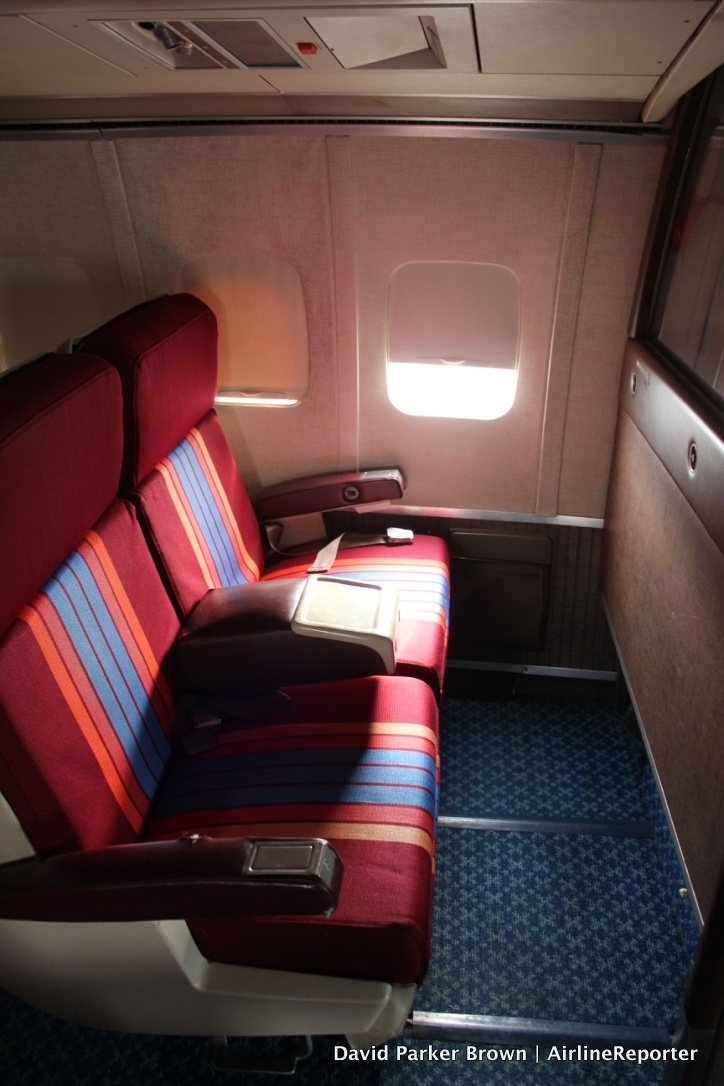
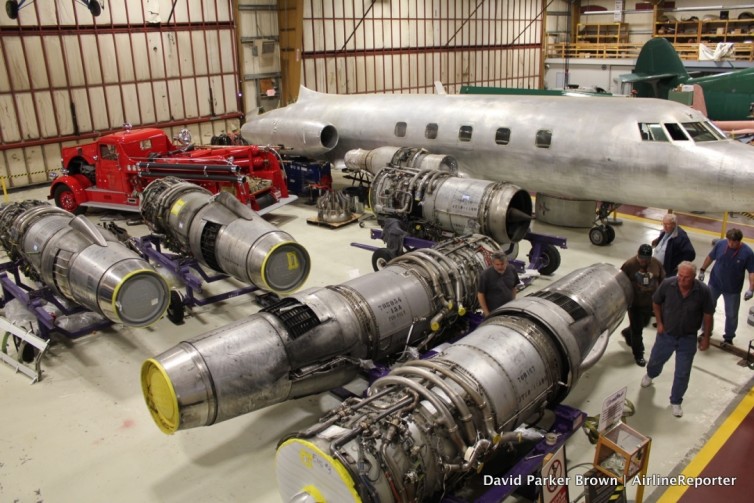
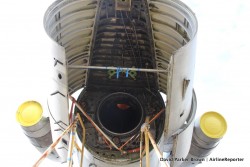
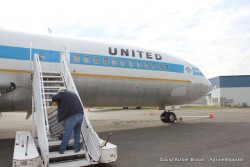
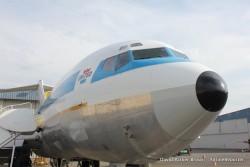
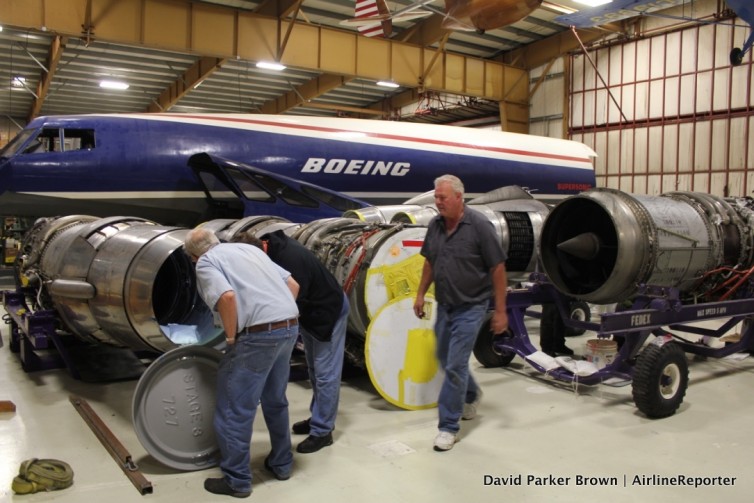
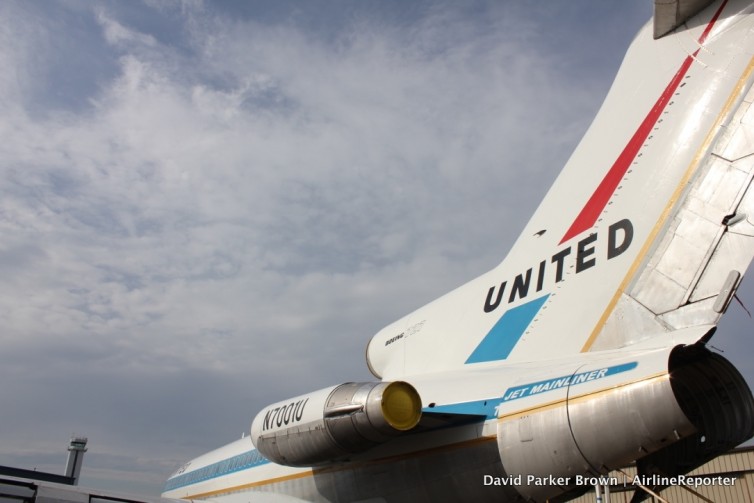
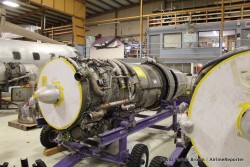
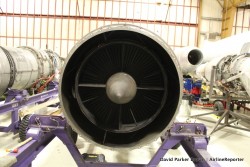
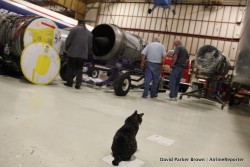
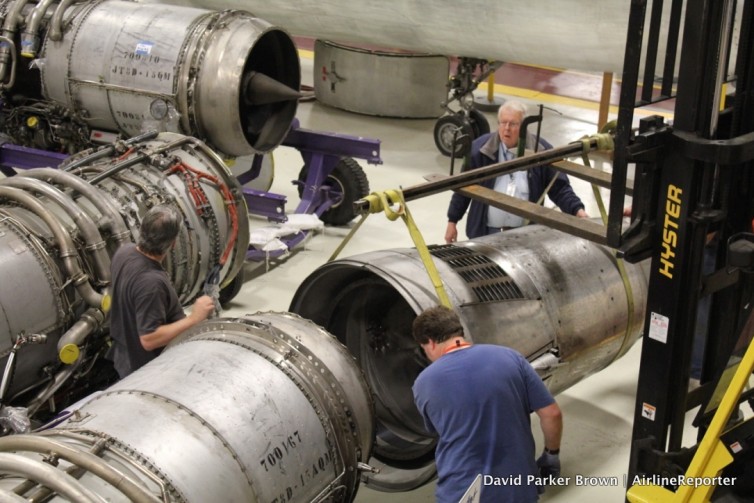
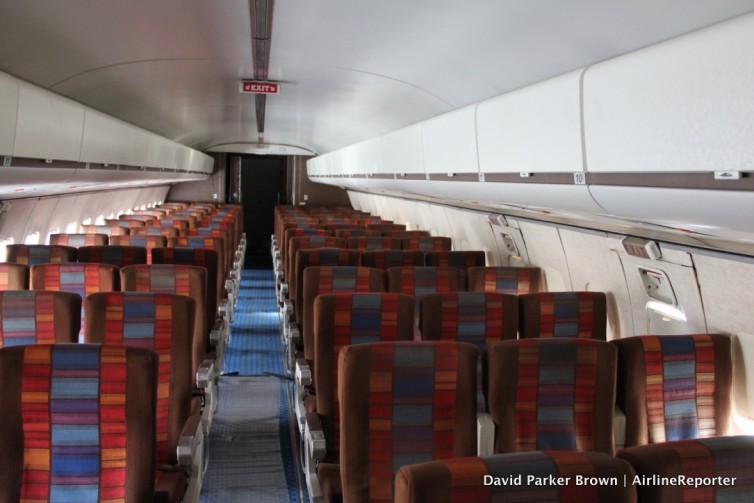
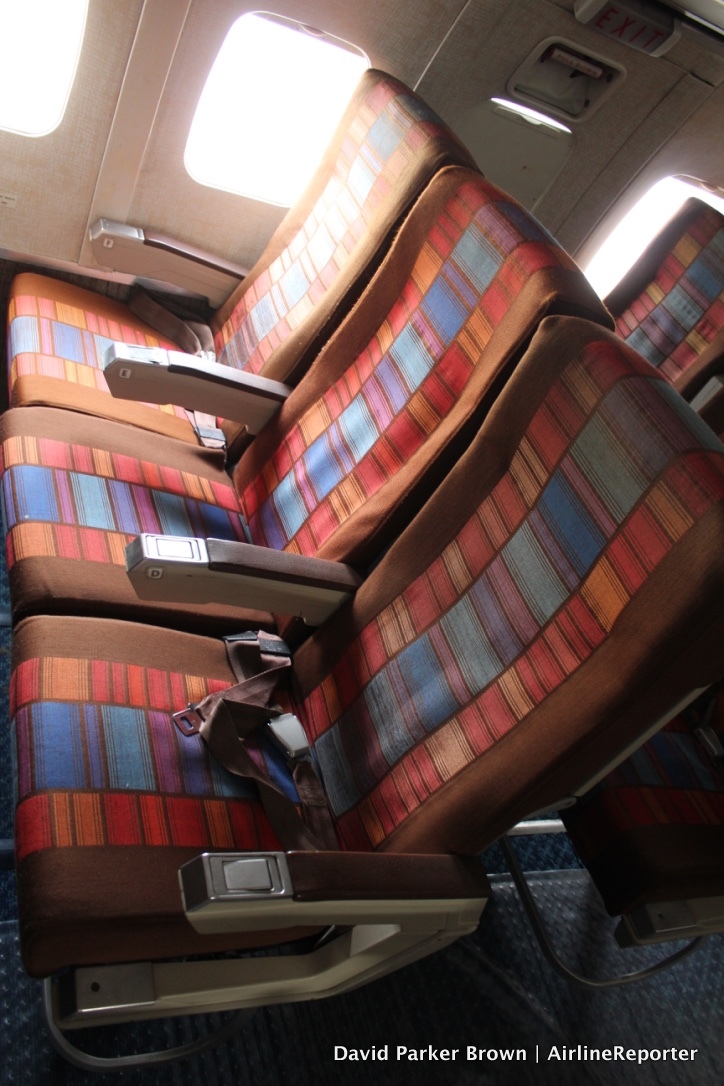
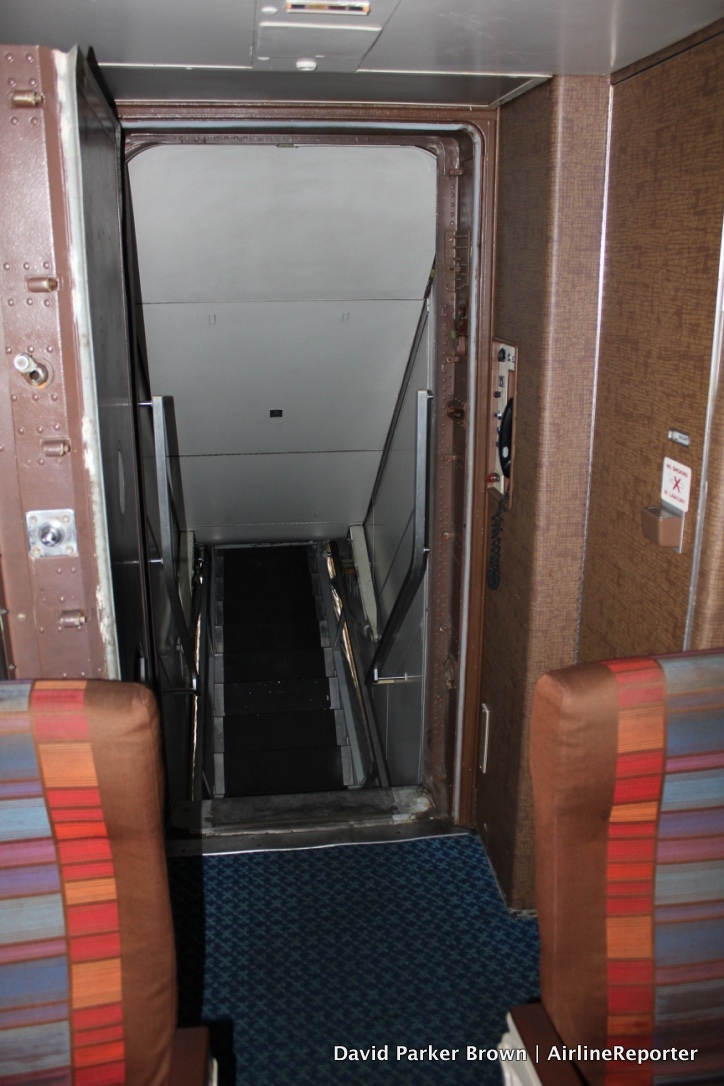
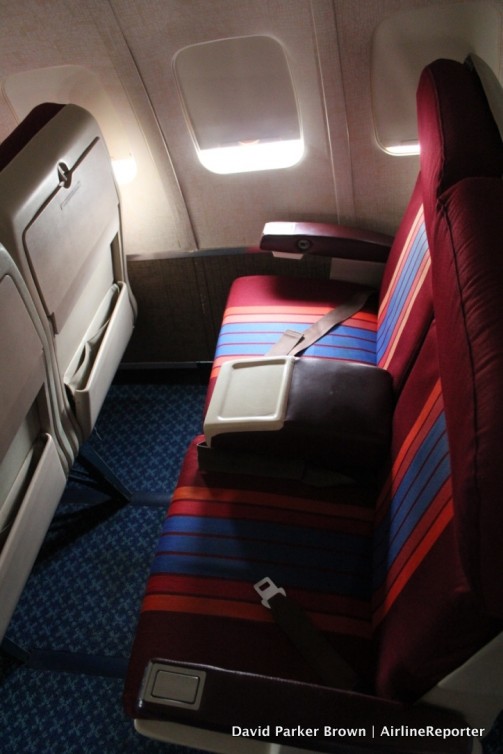
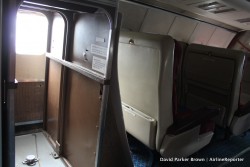
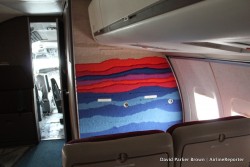
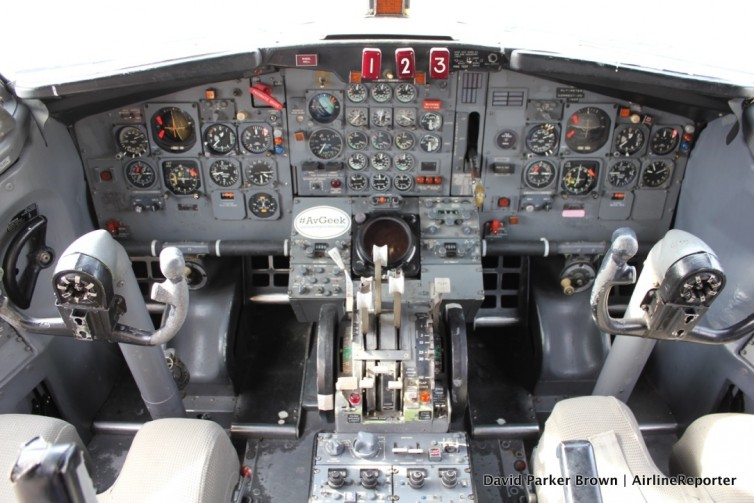
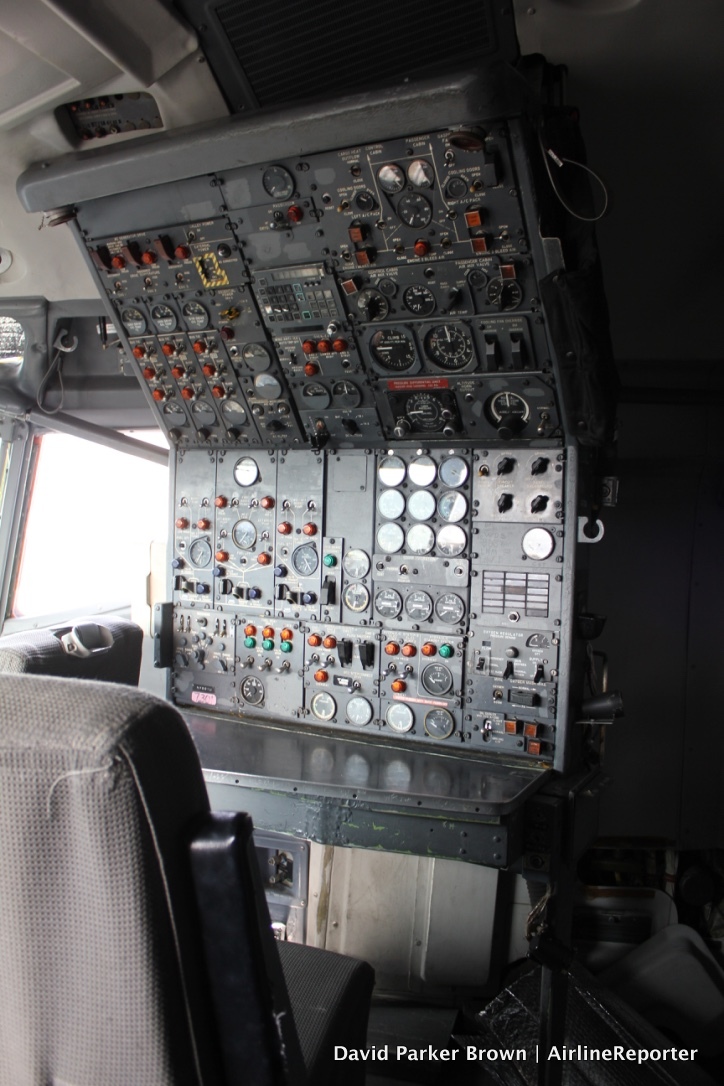
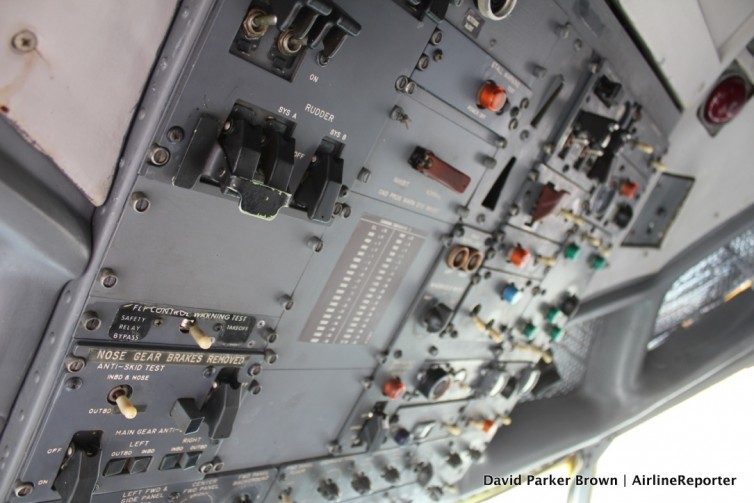
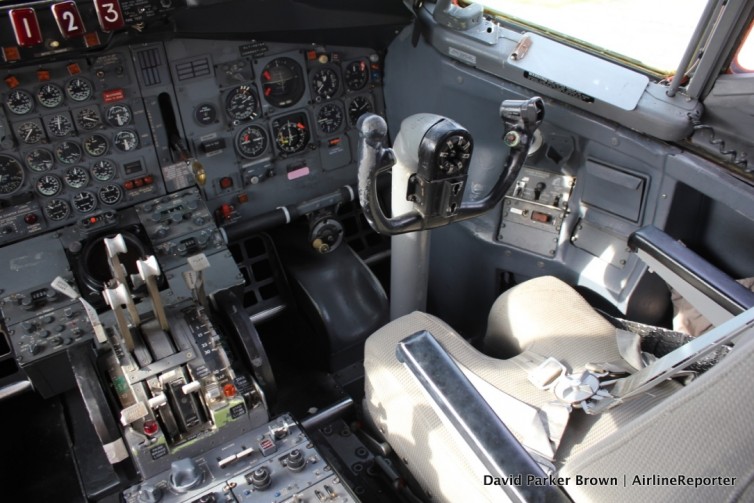
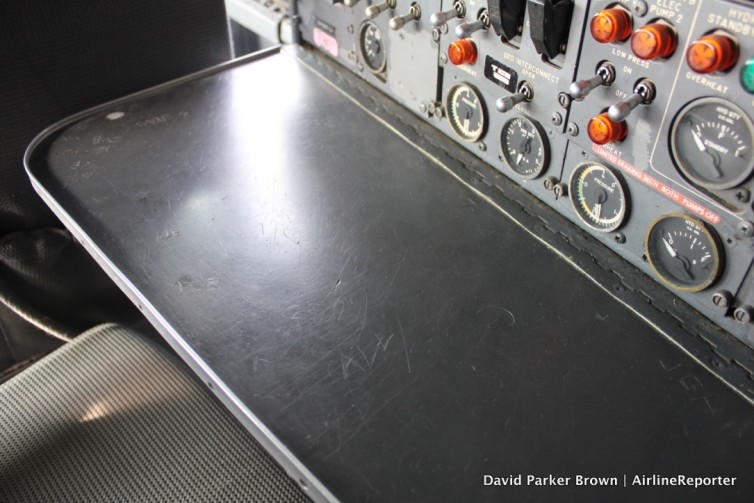
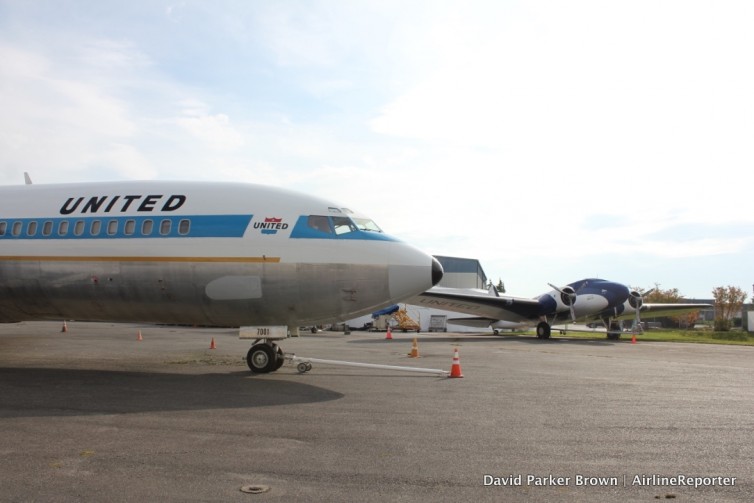
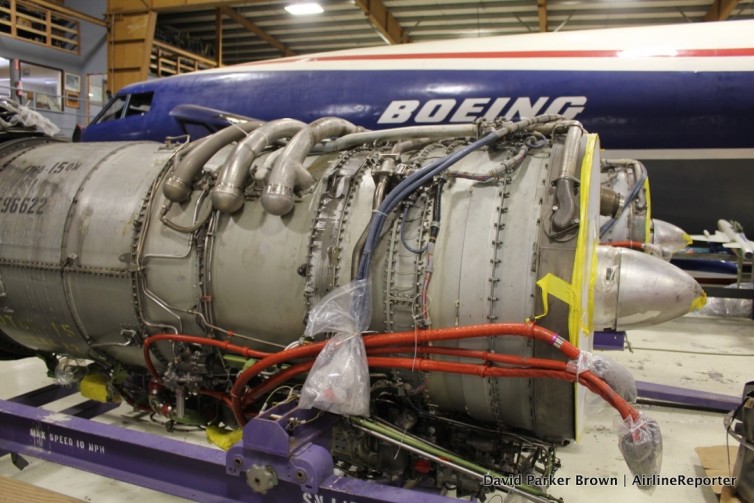
David
Simply put, a GREAT article about the United Boeing 727 restoration project at Paine Field. One fact you may have missed is that this aircraft was the first Boeing 727 prototype. After FAA Air Transport Certification, Boeing and United agreed to put this 727 into revenue passenger service. If you look at the right hand side of the fuselage just aft of the nose gear doors, you will see the number “7001” – First 727 identification. After United took delivery of the aircraft, it flew for almost 30 years before United decided to donate the aircraft to the Museum of Flight. As a MoF volunteer, I am very proud of the exceptional workmanship the “Resto” team have applied to this project.
Here is a link from Bob Bogash who leads the restoration efforts at Museum of Flight.
https://www.youtube.com/watch?v=v2AuHp7Ff5A
Thanks again for a great and well written update on the Museum of Flight Restoration Center Boeing 727 project
Take care
TC Howard, Bob Bogash and all of the volunteers who have toiled tirelessly – for years – to get this airplane back into original condition are heroes.
My father, Lew Wallick, was pilot on its first flight, and over the course of his career as a test pilot, flying B-47s through the 767, the 727 always remained his favorite. When TC invited me to “sit in your father’s favorite seat” a couple years ago I jumped at the chance. You better believe I’ll be on hand when that gorgeous airplane lands at Boeing Field at the end of its final flight to it’s permanent resting place at the Museum of Flight. I was six when my father flew it the first time so I don’t remember watching that first landing, but I’ll make up for that by witnessing it’s final landing. I only wish my father were still here to see it happen with me.
The prototype 727 was also the airplane in which my father came closest to dying during a test flight to prove to the FAA that the 727 could recover from a deep stall, a hair-raising story he didn’t share with me until long after he retired, just one of many amazing stories I collected from him and his Boeing flight test colleagues for my book Growing Up Boeing. So much history in that airplane!
Big thank you to all the volunteers and donors who are bringing the 727 home for all to see and enjoy.
Rebecca Wallick
Looking forward to meeting you at the delivery of E-1 to Boeing Field. I worked in Flight Crew Training from 1968 to 1971 where Shully got me checked out as a Flight Engineer on the 727 ( E-2 ). I feel very honored to be the guy to fly this plane back to BFI. Hope to possibly see some of the other folks from Flight Crew Training that are still in the Seattle area.
Tim, I”m glad to know the E1 will be in your capable hands for its final flight to Boeing Field. I”ll look forward to watching you deplane to the cheers of the crowd and meeting you then. One or more of Shuly”s daughters will likely be there as well.
Becky
Hey Tim,
Would be an honor to yank the gear for you. Over 5000 Hrs. on the 727 in all three seats!
Not current, but perhaps you could arrange for a sim ride?
Regards,
Ross “Rusty”Aimer
UAL Ret.
Ross,
Thank you for the offer – but I have arranged for the current crew that I fly one of the VIP birds with to do the delivery with me. Recency helps with the insurance requirements.
I know this airplane is special to a lot of UAL people. Hope you and some of the folks that flew this airplane over the years can make it to the delivery.
I was fortunate to work on this jet when a flightline A&P mechanic for United at LAX (1968 – 1971) and all our LAXMM mechanics knew the history of this airliner at that time. It is truly wonderful that the jet will finally be put into proper condition to ferry flight N70001U to her final museum display spot. After that happens we will plan a trip to come and see her one more time. For the record I have been a full time aviation and space artist for almost 45 years after being furloughed from Boeing 727 FE classes at United in 1971. I did not return to the line when recalled but rather have enjoyed a most remarkable career as an artist. When the 727s started getting parked after Sept 11, 2001 we hired an aircraft broker to find us the cleanest and lowest time late model Boeing on the planet. Our broker found ours in a movie lot in CA. We purchased the airliner from the wings forward and had it shipped to CO where we built a 2200 square foot art studio around the front 47 feet of the former United 727-222A which had been registered N7266U. The airliner is almost brand new — from a parts and condition point — only having about 2700 hours TT since mid-life D Check overhaul. Everything, including all the wiring, nose gear and tires, cabin windows, cockpit and cabin is almost brand new. The cockpit floor isn’t even worn. There are photos of the completed studio — which is attached to our home in the Broadmoor area of COS — on the Internet as well as our Facebook Page Rick Broome. Soon a story will be completed for our website too. It is amazing to see how much work was put into the overhaul and see all the brand new wiring, control cables and most of the flooring too. We are not in the tour business because of local covenants but wanted to share the story of another United Boeing 727 that was spared from the cutters torches. Our Boeing 727 is C/O number 21413, Line Number 1351; and still sporting the Wall Street paint scheme all UAL aircraft were painted with when America was attacked. The passenger versions of the Boeing 727 fleet in the United States was parked as a result.
You were spot on when you said those rear stairs remind you of DB Cooper. I thought the same thing. BTW does anybody think the sketches of DB Cooper look a bit like Sean Connery. Well, I’m just saying……….
I didn’t fly the first ones, but I have thousands of hours is this wonderful airplane (Delta Air Lines). Many, many fond memories. Before it was in service, I saw a 100 model at the then Memphis Metropolitan Airport that Eastern was taking on a tour of it’s stations (1963?). I was in college at the time going through Air Force ROTC and beginning my career in the air. Good luck with this baby!
My most favorite jet ever. TAA (Trans Australia Airlines) and Ansett Airlines flew them, 100 and 200’s for years here. I recently got a shot of an absolutely mint condition and refurbished (notice the wingtips) one here at Perth Airport, Western Australia.
See pic here:
https://instagram.com/p/9BSF_ctdXo/?taken-by=sivideo
Simon – Thanks for sharing the Pic of VP-BAP. I was on the crew on that trip – we really enjoyed our short stay in Perth. For another look at VP-BAP see the recent post Av Geek in the left seat. We are looking forward to doing the delivery flight of E-1 to the Museum of Flight hopefully in January.
Awesome read! Easily one of my favorite A/R reports. I do have a question that I’m sure someone can answer.
When did passenger jets start using the artificial horizon on the flight deck? I’ve noticed on a few of the older jets there was no AH. I’m used to seeing the blue (sky) horizon and the yellow (ground) separated by the aircrafts wings. For all I know there may be on on this B727 but I’m not seeing it
If these jets do not in fact have the artificial horizon how did pilots determine the aircrafts orientation?
Thanks all!
The largest round gauge in the center of both the captain and first officer positions is the instrument you are looking. The first officer’s (right side) due to lighting shows the light and dark contrast, light being sky and dark ground.
I believe it’s in the center panel top right. It’s a bit off center from being jostled around a bit during moves but is a fully functional gage. Thank you for your interest.
That one is the backup attitude indicator in case the other two fail.
The standby attitude indicator became a requirement after the United 727 crashed after takeoff from LAX.
They lost all electric power after a two generator dispatch, and a subsequent engine shutdown due to a fire warning.
I was about 8 living in Miami when this airplane came MIA. They were giving free rides so my Dad and I stood in line for a while. Basically it was a take off. Fly ove downtown Miami. Back and land.
What I really remember is how short it was compared to later stretch models.
Paul, I went to MIA on the arrival day Eastern’s First 721! ( I was age 13 then ). As I recall, it arrived around Noon. So, I’m unclear if this was the Delivery Flight from BFI; as it would have had to depart BFI around 0300h Pacific Time. Maybe the airplane stopped somewhere or overnighted enroute to MIA? It parked at Concourse 2. The event attracted substantial interest of spectators; as Eastern allowed us to board the airplane, after the arrival ceremonies. I was the FIRST such spectator to board that airplane; accessing it via the rear stairs!
However, I do NOT recall that Eastern offered ” free rides “; doing a short circuit over downtown and Miami Beach. I DEFINITELY would have been one of the herd – if Eastern did do that! So, those must have taken place on a different day?
It’s a privilege to be part of the 727 restoration team for this historic work! Reworking and reconfiguring engines is not an easy task by any means. The team represents many years of professional experience in aviation, working together to achieve the task at hand, historic flight to the main museum for permanent display. My day job is working as a physician and my hands must be clean! When I am at the restoration center working on these engines and other areas of this historic jetliner, it’s about getting your hands dirty! Thank you to Bob, TC, Tom, members of the team, and Seattle MOF volunteer department for this great opportunity. Thank you David for coverage and tracking of this historic moment and getting me in the engine rework photos! Stay tuned for the historic flight of the first servicable Boeing 727 prototype!
Absolutely great article! Gorgeous plane especially new interior!!!! Brought back memories of people actually dressing up to fly! Makes me wonder where the years have “flown.”
Fortunately perform the B727 course in the facilities of the Academy Flight United Airlines in Denver Colorado USA, in the year 1980 for the Company and there did Avianca Airlines B727-100 simulator and-200, whose aircraft flew in SAM and Light Avianca year 1980-1992 and then 1994-1996, demonstrating that the aircraft one of the most versatile flying in bad weather and difficult operations at airports in Central America, Colombia, Ecuador, Venezuela, Peru, Chile and Argentina whereWe operate this cute plane of great memories in normal operation and in emergencies such as del Ruiz volcano in Colombia-Armero where the November 13, 1986 killed 26 thousand.
I first flew the 727 for Western Airlines around 1968-WAL only had 727-200s. After many 1,000s of uneventful flying, I retired early in 1986. I didn’t see another 727 until last year when a privately owned 727-100 came to Thermal, CA., for fuel. I got a tour inside! What a conversion with bedrooms, an office, a galley, two bathrooms and a few seats. Everything was gold plated including the throttles (thrust levers). I too was amazed at how big it looked after flying twin Cessnas for 30 years.
Dick- Hope you can make it to Boeing Field for the delivery flight of E-1. Hopefully we can get it done in January. I have heard from lots of our old friends at Western Airlines in the Seattle area that I believe will be on hand for the event. Hope to see you there. See the recent post Av Geek in the Left Seat for lots of good Pics.
I saw this one out on the ramp and did a wing tip repair on one of the first ones when the pilots hadn’t learned to come in hot and dragged a wing or two back in the beginning. This one was almost as bad as converting from props to jets for some of the fly guys…it still has a fascination for me though….
Thank you so much for the update here. And, yes, please keep us posted regarding any scheduled date for the flight to Boeing Field. I look forward to watching the 727’s arrival, but have had difficulty finding reliable sources of information regarding the flight.
Oh, this was one of my favorite planes to fly when I was a Flight Attendant for United! This brings back some good memories of a time when flying was SOOO different than it is now. Thank you all for your involvement in this project and for making me smile.
13 years in the right seat, 8 years in the lsft seat!
13,110 hours
Still my favorite Boeing!
THIS BIRD HANDLED LIKE A STEARMAN WITH LIGHTER AILERONS!
Thanks so much for the update on the restoration and so many interesting and nostalgic comments. I was a UA station agent at OAK when the first 727s were delivered and we watched the initial SFO crew training flights – “touch and goes” – at the Oakland Airport. Prior to passenger service they permitted some very steep climb outs…what a kick. I also had the pleasure of working on the ramp and boarding pax on this particular aircraft numerous times. What a terrific time to work in the industry. I had a wonderful 21 year career with UA and later, 4 great years years with CO. Thanks for the memories.
Is there any update regarding a possible date for the flight? Thanks so much for any additional information.
Hey Brian,
The official answer is “when it is ready.” 🙂
They are hoping in Feb, but you know how dates go… always issues come up.
You can keep up with the status here: http://www.rbogash.com/727/Refurb/Refurb_Status.html
Cheers,
David | AirlineReporter
Thank you, David!
My last flight on a Boeing 727, was from Darwin to Adelaide, in 1996, on Ansett.
I used to love flying on them, & kept a flight log.
My first was on the ‘Gregory Blaxland’ , VH-TJD, owned by TAA, in 1968.
Then fell ‘in love, with the Boeing 767, Domestically, & the beautiful, big, powerful Boeing 747, Internationally.
All QANTAS owned, & well looked after.
Saw ’60Minutes’ Doco. of the last B767 going to Victorville for ‘retirement’. Oh dear! Bawled my eyes’ out, as had been on it, of course!
Still working on one in 2024!